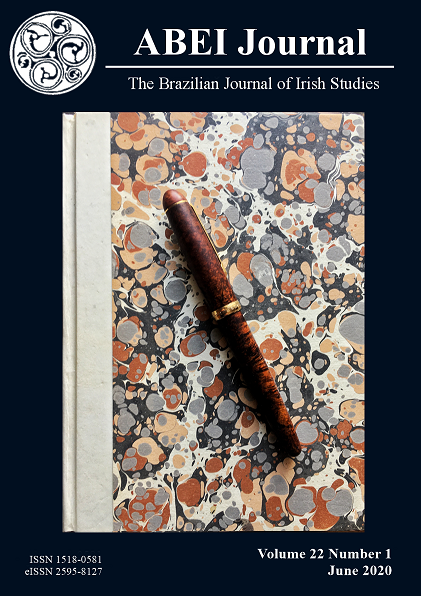O Tempo em John Banville: de Einstein a Bergson
DOI:
https://doi.org/10.37389/abei.v22i1.3855Palavras-chave:
Envelhecimento, John Banville, Henri Bergson, Birchwood, Doctor Copernicus, Albert Einstein, The Infinities, TemporalidadeResumo
Há um claro envolvimento com as teorias do tempo na obra de Banville como um todo, desde em seus primeiros livros publicados até nos romances do século XXI. Considerando os conceitos de idade e envelhecimento, exploro como os personagens de Banville adotam e interrogam as ideias concorrentes de Albert Einstein e Henri Bergson sobre o presente e a passagem do tempo, deixando de favorecer o primeiro e priorizando o segundo. A concepção de Martin Heidegger de Dasein, um Ser em direção à morte, permite-me explorar como os personagens de Banville evocam a relação espaço-tempo de Einstein e séries de “agoras”, ou a Duração psicologizada de Bergson (Durée). Isso é confirmado na narrativa subvertida e anti-atávica de Gabriel Godkin em Birchwood (1973), na batalha pela autenticidade entre Copernicus e Rheticus em Doctor Copernicus (1976), e na forma como Hermes controla o tempo dos mortais e tenta o seu melhor para envelhecer em The Infinities (2009). Concluo que a preferência crescente dos personagens de Banville pelos tropos bergsonianos e einsteinianos indica uma aceitação e um envolvimento bem-sucedido com o processo de envelhecimento.
Referências
Banville, John. [1973] Birchwood. New York, NY: Vintage International, 2007.
---. Doctor Copernicus. London: Picador, 1999.
---. The Infinities. London: Picador, 2010.
---. Mefisto. London: Picador, 1999.
---. The Newton Letter. London: Picador, 1999.
---. Physics and Fiction: Order From Chaos. New York, NY: New York Times Publishing Company, 1985.
---. “What do clocks have to do with it?” London Review of Books. V. 38 No. 14 (2016): 34–5.
Beck, Adam. “Heidegger and Relativity Theory: Crisis, Authenticity and Repetition”. Angelaki. V. 10 No. 1, 2005, pp. 163–79.
Bergson, Henri. The Creative Mind. Trans. M. L. Andison. Westport, CT: Greenwood Press, 1971.
Čapek, Milič. Bergson and Modern Physics: A Reinterpretation and Re-evaluation. Dordrecht: D. Reidel, 1971.
Currie, Mark. About Time: Narrative, Fiction and the Philosophy of Time, Edinburgh: Edinburgh University Press, 2007.
Derrida, Jacques. Signéponge = Signsponge. Trans. R. Rand. New York, NY: Columbia University Press, 1984.
Heidegger, Martin. Being and Time. Trans. J. Macquarrie and E. Robinson. New York, NY: Harper Perennial, 2008.
---. The Metaphysical Foundations of Logic. Trans. M. Heim. Bloomington, IN: Indiana University Press, 1992.
Imhof, Rüdiger. “Swan’s Way, or Goethe, Einstein, Banville—The Eternal Recurrence”. Études irlandaises. V. 12 No. 2, 1987, pp. 113–29 .
Ingman, Heather. Ageing in Irish Writing: Strangers to Themselves. Basingstoke: Palgrave Macmillan, 2004.
Kreilkamp, Vera,.“The Novel of the Big house”. Ed. J. W. Foster. The Cambridge Companion to the Irish Novel. New York: Cambridge University Press, 2006.
Lybeck, Eleanor. All on Show: The circus in Irish literature and culture. Cork: Cork University Press, 2019.
McMinn, Joseph. The Supreme Fictions of John Banville. Manchester: Manchester University Press, 1999.
Murray, Laura. Gods and Mortals Intersect in an Irish House. Paris: International New York Times, 2010.
O’Connell, Mark. John Banville’s Narcissistic Fictions. Basingstoke: Palgrave Macmillan, 2013.
Rovelli, Carlo. The Order of time. Trans. E. Segre and S. Carnell. London: Allen Lane, 2018.
Schwall, Hedwig. “Banville’s Caliban as a Prestidigitator”. Eds. N. Lie and T. D’haen. Constellation Caliban: Figurations of a Character. Amsterdam: Rodopi, 1997.
---. “An Iridescent Surplus of Style: Features of the Fantastic in Banville’s The Infinities”. Nordic Irish Studies. V. 9, 2010, pp. 89-107.
Scott, David. “The ‘concept of time’ and the ‘being of the clock’: Bergson, Einstein, Heidegger, and the interrogation of the temporality of modernism”. Continental Philosophy Review. V. 39 No. 2, 2006, pp. 189–213 .
Downloads
Publicado
Edição
Seção
Licença
Copyright (c) 2020 Nicholas Taylor-Collins

Este trabalho está licenciado sob uma licença Creative Commons Attribution-NonCommercial 4.0 International License.


